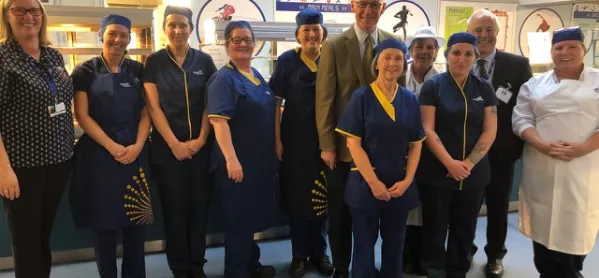- Home
- ‘We must not lose curriculum’s revolutionary changes’
‘We must not lose curriculum’s revolutionary changes’

Last Friday I spent a glorious afternoon at Blairgowrie High School in my own Perthshire North constituency. I had originally been invited to meet a group of senior pupils - more of which later - but went in a bit earlier to sample the school lunches provided by the staff of Tayside Contracts (see picture). There had been some media controversy about the quality of a turkey burger and I wanted to see the approach that was taken for myself, given the importance we attach to nutritional school meals.
First, I thought the meals were well-prepared and presented, and provided a diverse choice for pupils and staff. Second, the catering staff put a lot of effort into encouraging pupils to eat healthy options. There was an evangelical zeal at the baguette bar to get salad involved! Third, I was struck by how much the catering staff were a part of the nurturing approach of the school. From the warmth of their welcome, to making sure young people had meals, to taking a keen interest in the wellbeing of pupils, it was clear the catering staff were essential to the working of the school.
An unexpected surprise guest at lunch was my dear friend Dougie MacLean, one of Scotland’s foremost musicians and songwriters, and a former pupil of Blairgowrie High. Dougie had come in to run a songwriting workshop - again, more of which later. Over lunch, we talked about how the school had changed since his education there. And we judged the biggest difference to be the nurturing relationships that exist now, which were not such a feature in Dougie’s days.
Quick read: Unicef to tackle child obesity and poverty in Scotland
Secondary school education in Scotland: It must be reviewed, MSPs say
Union survey: Multi-course classes ‘the norm in most Scottish schools’
Curriculum for Excellence: What will the ‘refreshed narrative’ of CfE achieve?
Leadership: Headteachers’ role has ‘changed enormously’
Then I met a group of senior pupils who are pursuing an SQA (Scottish Qualifications Authority) leadership award. I was one of a number of speakers from a variety of walks of life who met with the pupils to share some thoughts on the essential characteristics of leadership. The young people asked me many searching and challenging questions as they tried to establish what the true and effective purpose of leadership was.
Given all that is going on in the world, it is more than timely for discussions of this type in Scotland’s schools. I felt this was a very valuable experience for young people given the significance we attach in Scotland’s Curriculum for Excellence, to young people becoming confident individuals, responsible citizens, successful learners and effective contributors.
After my chat with the senior pupils, I went to observe the end of Dougie’s songwriting workshop. In one of the music classrooms, there was an atmosphere of unbridled joy. The young people had suggested a variety of words that reflected their impressions of Blairgowrie - berries, river, hills, mills to select a few - and Dougie had worked with them to compose a song.
They performed it for us all - including a rap component - to an enthusiastic response. The headteacher, Bev Leslie, asked the pupils what they had thought of the experience. They all said they had loved it and one pupil said: “It has been the best day of my life.”
My visit to Blairgowrie High School came at the end of a week in which the topic of subject choice - and the report of Parliament’s Education and Skills Committee - had been much aired. The committee report acknowledges that there is a wider range of subjects and alternative pathways than before but says that for S4 pupils in places it has narrowed. The report calls for more consistency at the same time as arguing against a one-size-fit-all approach. I suppose that sums up some of the dilemmas of education policy and the issue of subject choice.
In a traditional curricular approach, I doubt the leadership course on offer at Blairgowrie High School or the songwriting workshop or the Foundation Apprenticeships - of which there is an abundance - would exist. And these are all just small examples of an essential revolution in curricular approach that have been initiated by confident professionals and taken forward by enthusiastic pupils. As we look in more depth at these issues in the Senior Phase Review proposed by the Education and Skills Committee that I have agreed to undertake, we must be very careful that we do not lose any of this valuable, revolutionary curricular development.
Why? For the simple reason that I believe it is serving the young people of Scotland well for the future. Perhaps that is why 93 per cent of young people - a record number - leave school and go on to work, training, further or higher education.
One final thought on my glorious afternoon at Blairgowrie High School. Not everything will be perfect. But while all this nurturing activity is underway, and this curricular development is taking place, attainment is rising and the gap is closing. I am determined that nothing should distract us from succeeding in that task.
John Swinney is Scotland’s education secretary and deputy first minister
Register with Tes and you can read two free articles every month plus you'll have access to our range of award-winning newsletters.
Keep reading with our special offer!
You’ve reached your limit of free articles this month.
- Unlimited access to all Tes magazine content
- Save your favourite articles and gift them to your colleagues
- Exclusive subscriber-only stories
- Over 200,000 archived articles
- Unlimited access to all Tes magazine content
- Save your favourite articles and gift them to your colleagues
- Exclusive subscriber-only stories
- Over 200,000 archived articles



